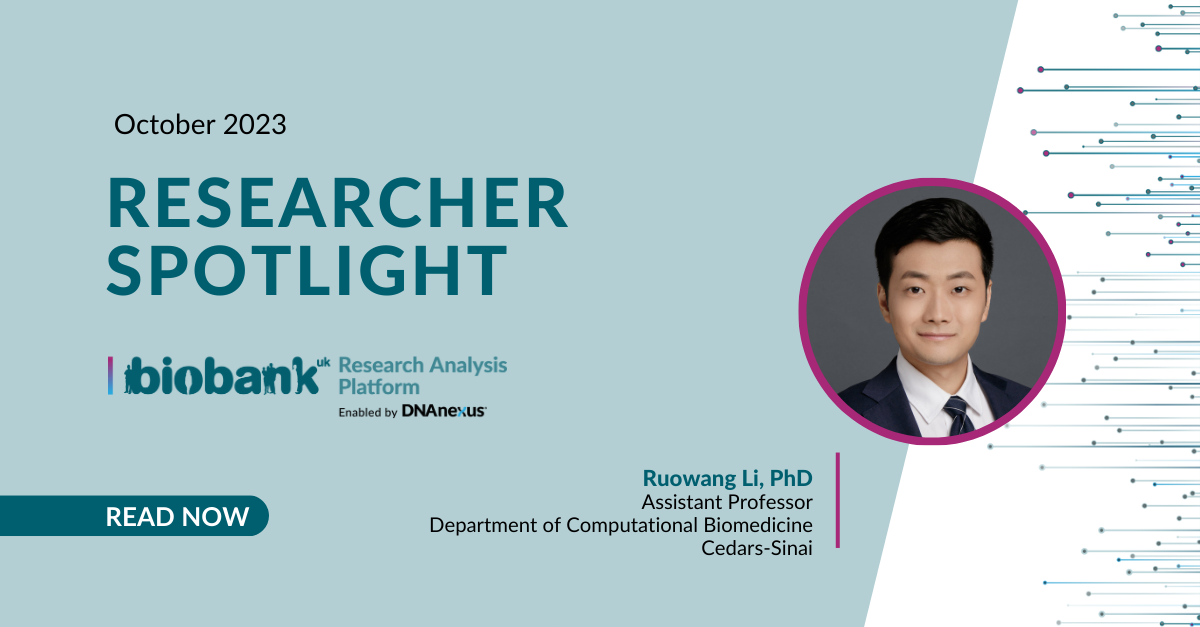The Monthly Researcher Spotlight is our section highlighting the exciting work of the UK Biobank Research Analysis Platform user community. If you would like to be featured, email community@dnanexus.com.
This was simultaneously published in the October 2023 UK Biobank RAP Newsletter. You can sign up for future installments here.
This month's Spotlight features Ruowang Li, a researcher who works on using computational methodologies and multi-omics data to improve our understanding of disease.

Ruowang Li, PhD
Assistant Professor, Department of Computational Biomedicine
Cedars-Sinai
What are the focus and discovery highlights of your research?
My research group focuses on developing computational methodologies to improve our understanding of complex diseases by harnessing large-scale clinical, epidemiological, environmental, imaging, and genetic data. Our work prominently features the utilization of the UK Biobank dataset. For example, we have employed the clinical data within the UK Biobank to identify individuals with cardiovascular diseases and mental disorders. Using this cohort, we developed and applied new statistical models aimed at identifying genetic variants potentially linked to both types of diseases, or pleiotropic associations. The identification and characterization of pleiotropic genetic variants are essential for a comprehensive understanding of complex diseases. To more effectively synergizing the UK Biobank with other population-scale datasets, we have developed federated learning algorithms that can efficiently extract and integrate information from diverse datasets, enabling researchers to improve the power and generalizability of their studies without the necessity of downloading individual-level participants’ data. In addition, our research extends to developing methods to refining genetic risk prediction of complex diseases. Advancement in this area holds the potential to positively impact disease detection and treatment options.
What are some of the key questions that you are looking to answer using UK Biobank data?
Every dataset, including the UK Biobank, possesses distinctive characteristics. A key question we are exploring now revolves around using the UK Biobank data to produce more generalizable research result. One effective approach of enhancing research generalizability involves tapping into more representative datasets. Consequently, integrating the UK Biobank with other datasets would improve the diversity of the data, making it more reflective of the general population and thereby enhancing the generalizability of our research. However, privacy considerations and logistic/infrastructure requirements present significant roadblocks in combining various datasets. We are working on developing federated learning algorithms designed to integrate various datasets, requiring only data summary statistics. These algorithms need to be carefully designed for each model; for instance, linear and logistic regression require different algorithms. The goal for these algorithms is to achieve results that are nearly identical or identical when compared to using individual-level data so that they can be broadly applied to the UK Biobank and other datasets.
How has the UK Biobank Research Analysis Platform (UKB-RAP) helped you perform your research?
The size and scale of the UK Biobank data is enormous. The analysis and storage of such data require significant investments in computational infrastructures that potential could be a barrier to utilizing this valuable resource. The UKB-RAP system has allowed us to quickly access the data and set up analysis environments with just a few clicks. We could easily conduct model training and evaluation using the platform’s extensive computational resources (CPUs, GPUs, and ample data storage). In addition, the UKB-RAP platform provides access to additional datasets, such as the whole genome and exome sequencing data, that are extremely valuable for genomics research. Overall, the UKB-RAP is a fantastic resource that our group will continue to actively be using moving forward.

.png)
.png)
.png)